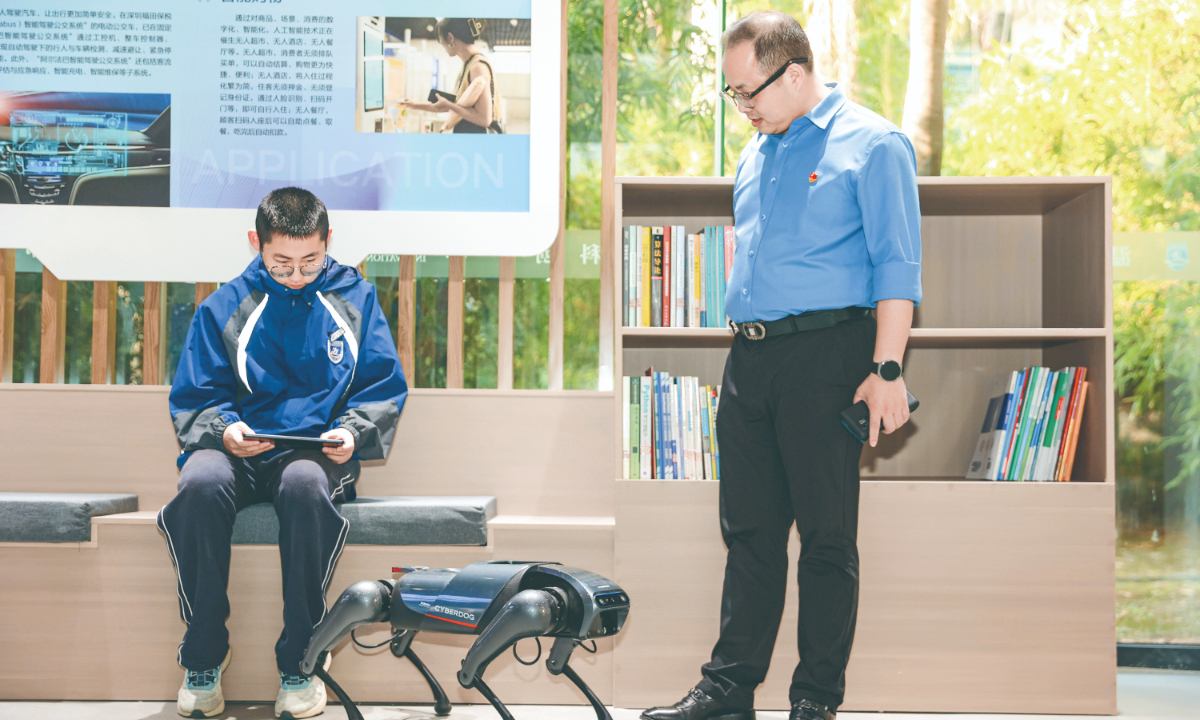Promoting AI for future innovators: 184 primary, secondary schools in China chosen to explore new models

A student shows how to control a robotic dog to a visitor in Wenzhou No.22 Senior Middle School, East China’s Zhejiang Province in October, 2023. Photo: Courtesy of Wenzhou No.22 Senior Middle School
With the release of chatbot ChatGPT, text-to-video model Sora and other cutting-edge information technologies, artificial intelligence (AI) tech has sparked heated discussion due to the challenges and opportunities it brings. It also raises the topic of how to keep AI education up to date with the latest trends and technologies.
In an effort to promote the development of AI education, China's Ministry of Education (MOE) last week announced a list of 184 primary and secondary schools across the country selected as AI education bases. The move aims to further focus on exploring innovative new concepts, models and solutions in AI education through pilot programs, creating exemplary cases and experiences that can be shared, the MOE said.
The MOE said it will enhance support and guidance for designated AI education bases, calling for them to take the lead in developing AI school curricula, mainly relying on information technology, general tech courses in primary and secondary schools to enrich educational resources further, innovate teaching and learning support services, and conduct teacher training.
Empowering education with AI
Regions across the country have already made various explorations in AI education during recent years, encouraging teachers and students to keep studying in this field.
Take Beijing as an example. A total of six schools from the capital city have made the list. The city has been making efforts to actively promote the integration of AI in education reform, with the main goal being to enhance teaching efficiency and accuracy by utilizing AI technology to assist teachers with large amounts of data and models, according to the municipal education authorities.
Besides Beijing, other cities including Shanghai, Wenzhou in East China's Zhejiang Province, and Shenzhen in South China's Guangdong Province, have all started to explore AI education as a way to encourage more students to develop critical thinking skills and problem-solving abilities.
In Shanghai Luwan Senior High School, one of the listed schools as the AI education bases, students are categorized into general courses, advanced courses, and high-level courses designed for a low number of students. "Every student can have access to some basic AI knowledge, such as graphic programming, and using AI to solve practical problems. For advanced courses, they will study specific projects, such as autonomous driving, intelligent logistics and drone programming," Zhang Xiaojun, a teacher who tutors students in science and tech classes from this school, told the Global Times.
For high-level courses, the school will provide further support such as professional resources to meet the students' studying needs and help students to complete their scientific research, or encourage them to participate in some innovative competitions, Zhang said. The school will also hold AI activities for students in the city, indicating its leading and exemplary role, providing students with a broader innovation platform through project-based practices. For instance, the 3rd "AI Future" innovation conference for the country's secondary schools was held at Shanghai Luwan Senior High School on November 18, 2023.
In another selected school base, Wenzhou No.22 Senior Middle School in East China's Zhejiang Province, AI education has been explored for nearly five years. The school in Wenzhou has incorporated AI curriculum standards into the information technology and general technology fields, integrating course content and practical applications into the school's AI education space. The space combines design, teaching and operation, and is equipped with 3D printers, laser engraving machines, high-end computers and other advanced equipment, Ding Die, vice principal of Wenzhou No.22 Senior Middle School, told the Global Times.
The school will enhance and expand AI courses, making them more accessible to students. "We will also work to increase students' engagement with AI projects at universities, helping them to better understand and plan for their future careers while studying in the field," Ding said.
Emphasizing innovation
Chinese schools have been making efforts to reform their curriculum to include AI education, which is in response to its rapid development of AI. AI and big data management have even become popular new majors in Chinese universities, aiming to cultivate talents who can adapt to the digital age, Xiong Bingqi, director of the 21st Century Education Research Institute, told the Global Times. The common consensus predicts that AI will bring about significant changes in the future job market. Adjusting school education by adding new majors and courses is not enough, while "education should move from teaching students to acquire knowledge to teaching them how to learn, innovate and create," said Xiong.
Additionally, the promotion of AI education also needs a large number of teaching resources. Zhang, the teacher from Shanghai Luwan Senior High School, said that systematic training and an incentive mechanism will be beneficial to cultivating more teachers in this sector. Ding, the vice principal, also echoed this opinion that their school will encourage teachers to take every opportunity to train in AI teaching. Ding, the vice principal, also echoed this opinion that their school will encourage teachers to take every opportunity to train in AI teaching.


